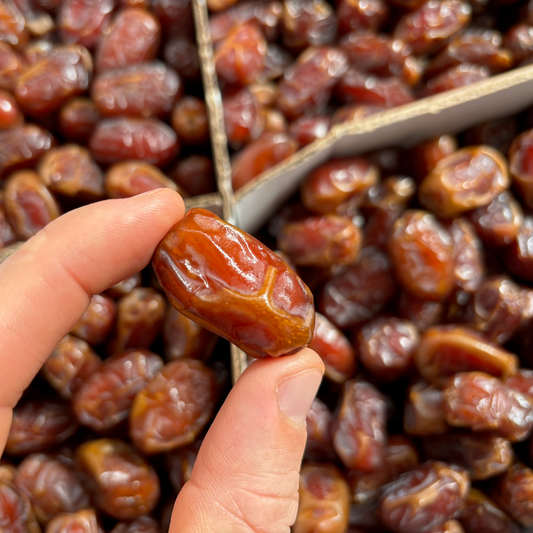fruit notes
Every year that we catch the short harvest window of Gold Dust peaches from Masumoto Family Farm, we’re reminded of how special they are. This year, the crop is even smaller than anticipated! What makes Gold Dust peaches unique is their appearance—they arrive small, pointy, fuzzy, and mostly gold in color. When ripe, they’re so delicate that even a fingerprint can bruise the fruit. All of these characteristics make this heirloom peach unfavorable for the commercial market, which is why it’s fallen out of style. Nikiko says that no matter how hard they thin the fruit, the peaches just never “size up.” Yet the Masumotos continue to grow them, nurturing the trees year after year. Once you bite into one of these juicy, silky, and rich-tasting peaches, it all makes sense. This year, Nikiko says they’re “intoxicating.” The Gold Dust has its own fan club! Store on the counter. Grown organically by Masumoto Family Farm in Del Rey.
We feel a sort of romantic attachment to Royal Blenheim apricots. Just hearing the name in the off-season makes our hearts flutter. Lucky for us, Good Humus in Capay has a bumper crop this year! Blenheims are so flavorful—floral, freestone, and a top-tier variety that really sets the standard for apricots. Truly, it’s in a category of its own :) Blenheims are unusual in that they ripen from the inside out, so they rarely develop the deep orange color that other varieties do. Because of their lighter color and frequent green shoulders, they lack the visual appeal of more commercial varieties. But their flavor is unmatched, with a jammy interior—especially if you let them relax on the counter for a couple of days. Store these on the counter. Grown organically by Good Humus in Capay.
John and Armen Carlon own and operate one of the oldest blueberry farms in California. They bought the farm in 1986 and were among the first to become certified organic. Of their 61 total acres, over 85% is native woodland, left as wild habitat. On the 8.5 acres they cultivate, they grow almost exclusively heirloom blueberry varieties you won’t find elsewhere in California. John describes them as “old-school” highbush varieties—deeply flavorful blueberries with tasting notes reminiscent of wild berries. This week, they’re harvesting Duke and Bluetta blueberries. Duke are the large berries in the mix, and Bluetta are smaller, with that signature “wild” flavor. Store in the fridge. Grown organically by Sierra Cascade Blueberry Farm in Forest Ranch.
California cherry season is late this year—and the crop is smaller (read more here)—so we really mean it when we say they’ll be gone in the blink of an eye. While cherry season starts earlier in Southern California, the arrival of Bingcherries signals that it’s really cherry season here in Northern California. With just a few short weeks of harvest, we never want to miss out on Bing cherries. John and Casey have one acre left of beautiful Bing and Rainier cherries. These 25-year-old trees are big and gnarly (in that cherry tree kind of way)—so big that Casey, a self-proclaimed tree hugger, can’t wrap her arms around the trunk. Store in the fridge. Grown organically by Lagier Ranches in Escalon.
As you’ve probably noticed, it’s definitely strawberry season in California right now. It seems like everyone has strawberries, but few compare to the deliciousness of Swanton’s Chandler strawberries, grown on the coast of Santa Cruz County. Sweet and floral, the texture of Chandlers is just perfect. Most farms don’t grow this variety anymore because of how soft and delicate the fruit is—but it’s definitely one of fruitqueen’s favorite strawberry varieties. We’ve heard from fan club members that we’ve “ruined strawberries” for them—so, good luck out there. Store in the fridge. Grown organically by Swanton Berry Farm in Davenport.
Local blackberries are just starting up, and we should see them throughout the summer and into fall. These Freedomblackberries from Yerena Farms are big, juicy, and nearly on the verge of bursting if you squeeze them too hard! This is one of the first varieties of the season. The Freedom variety is sweet, soft, and juicy—a perfect prelude of what’s to come. Store in the fridge. Grown organically by Yerena Farms in Watsonville.
It’s easy to overlook the June Crest yellow peaches from Masumoto Family Farm—they come and go in a flash. Some years, we don’t even get any! At Masumoto, it’s always been a lower-volume crop. Last I heard, they’re experimenting with ladderless trees. This means pruning and shaping the trees more aggressively, which can lead to smaller yields in the following season. Hearing that always amazes us. Three generations of farming, and they’re still experimenting and trying new things. Farmers are some of the most resilient people we know—and Masumoto Family Farm is such a great example of that. Store on the counter. Grown organically by Masumoto Family Farm in Del Rey.





